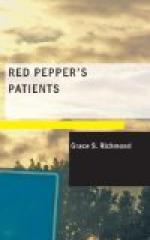For a little, coming as he had from the strong light of the September afternoon, he could see absolutely nothing; but as his vision cleared he was able to make out a small group of people far toward the front of the spacious interior, and the form of the organist himself before his manuals low at the right of the choir. But he had to look for some time before he could descry at the farthermost side of the church a solitary head bent upon the rail before it. Toward this point the young man slowly made his way, his heart hammering a most unwonted tattoo within his broad breast.
Several pews behind and to one side of the kneeling figure he took his place, his gaze fastened upon it. He looked his fill, secure in his own position, which was in the shadow of a great stone pillar, where the dim light from the sombre-toned windows did not touch him. And, as he looked, the conviction he had had since his first meeting with this girl deepened and strengthened into resolution. He would not lose her again, no matter what it might cost to hold her. He would not believe a man could be mistaken in that face, in that exquisite and arresting personality. There was not such another in the whole wide world.
Suddenly she turned, and evidently she saw that some one was near her, though he knew it was not possible that she had recognized him. She sat quite still for another five minutes, then rose very quietly, gathering up the remembered black handbag, and moved like a young nun into the aisle, head downbent. King slipped out of his pew, made a quick circuit around the pillar, and met her squarely as she came toward him.
He stood still in her path, and she, looking partially up to pass him with that complete ignoring of his presence which young women of breeding employ when strangers threaten to take notice, heard his low voice: “Please don’t run away—from your friend!”
“Oh—Mr. King!” Her eyes, startled, met his indeed, and into her face, as she spoke his name, poured a flood of beautiful colour, at sight of which King all but lost his head.
He managed, however, to retain sufficient sanity to grasp her hand after the fashion approved as the proper sign of cordiality in meeting a valued acquaintance, and to say, in an outwardly restrained manner: “Won’t you sit down again here? We can talk so much better than outside—and I must talk with you. You have no idea how hard I have tried to find you.”
She seemed to hesitate for an instant, but ended by slipping into the pew by the pillar where King had been sitting, and to which he pointed her, as the most sheltered spot at hand, where the group of people at the front of the church were hidden from view, and only the now low and throbbing notes of the organ could remind the pair that they were not absolutely alone.
“This is wonderful—for me,” King began, in the hushed tone befitting such a place—and the tone which suited his feelings as well. “I have thought of you a million times in these months and longed to know just how you were looking. Now that I see for myself my mind is a bit easier—and yet—I’m somehow more anxious about you than ever.”




